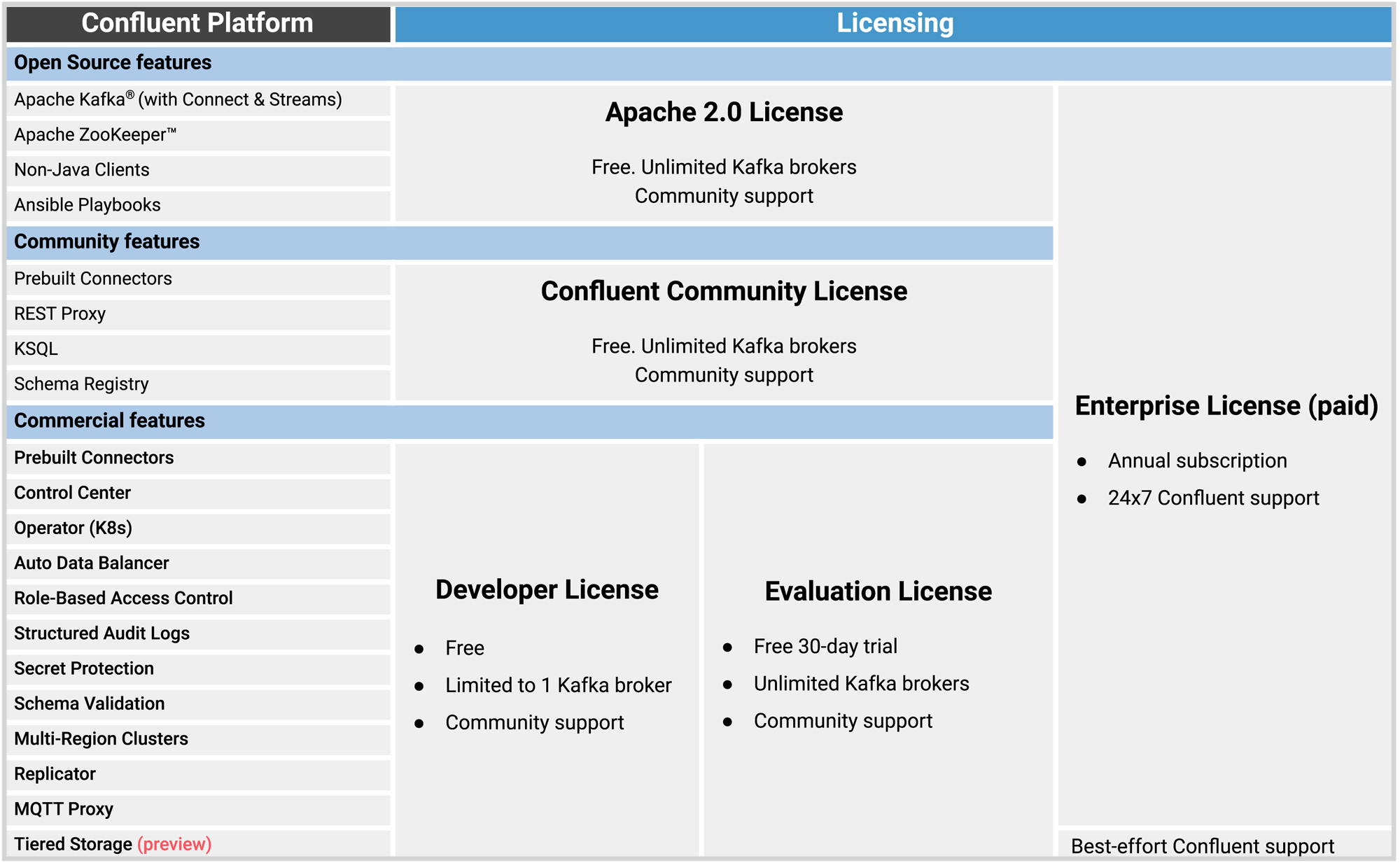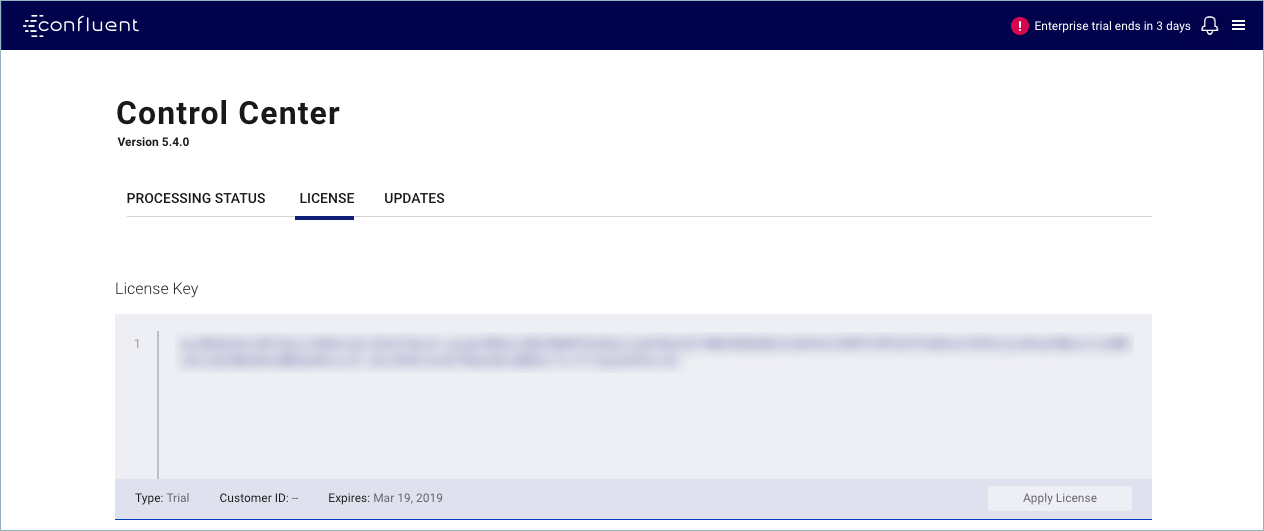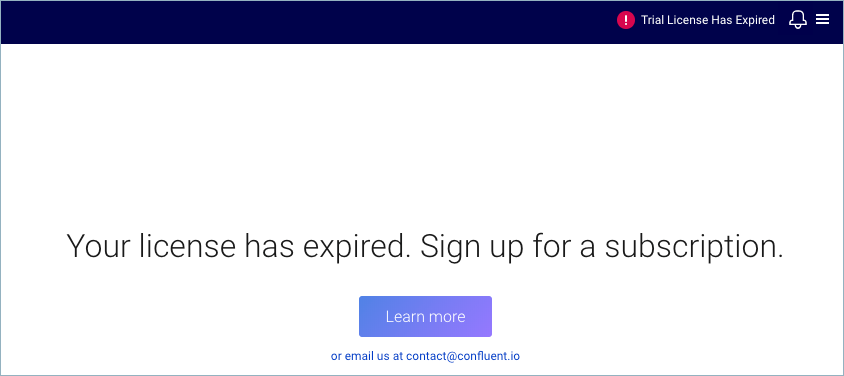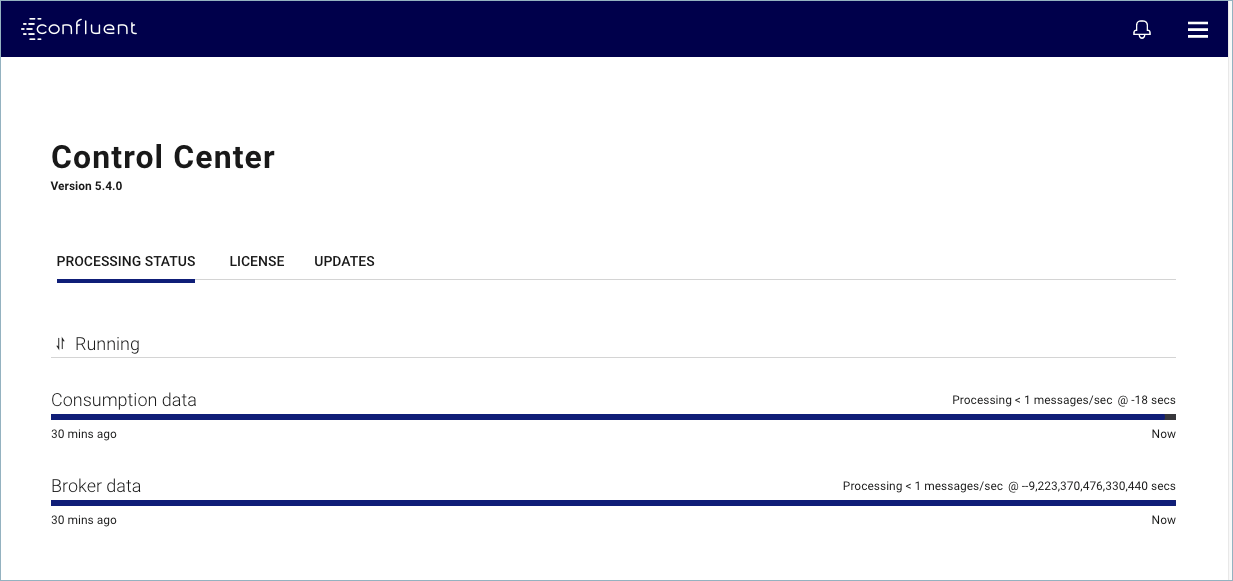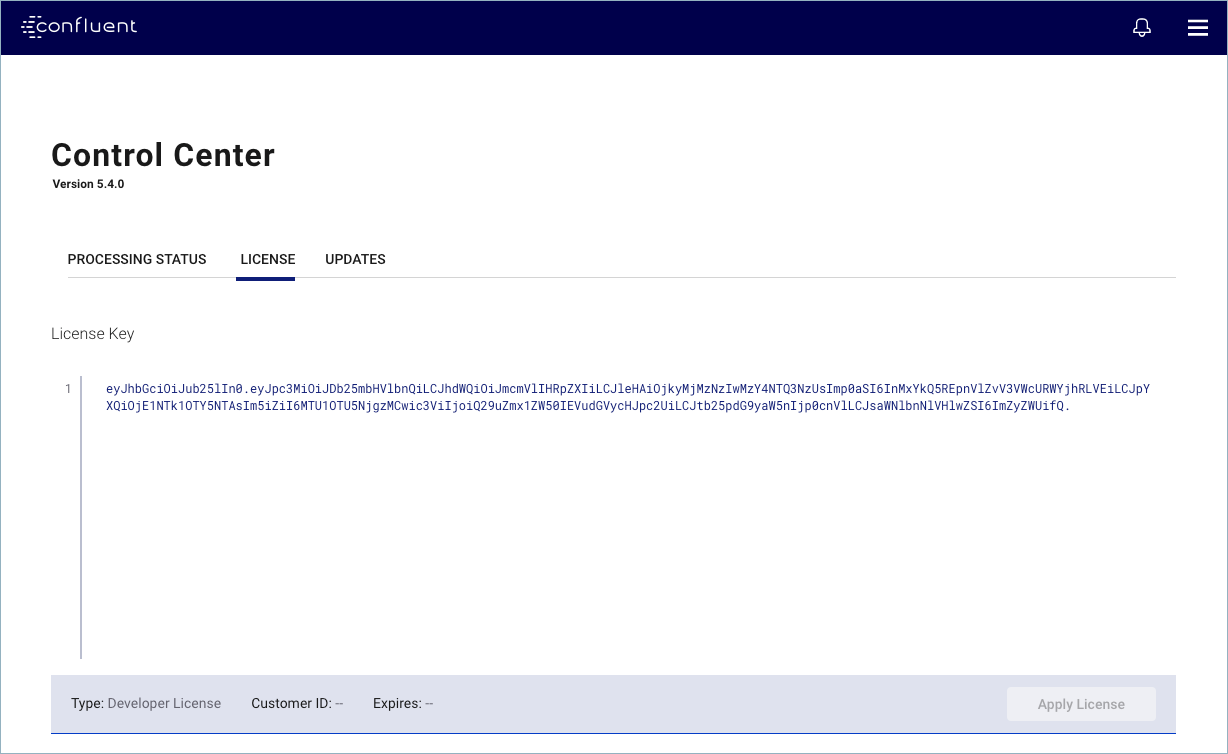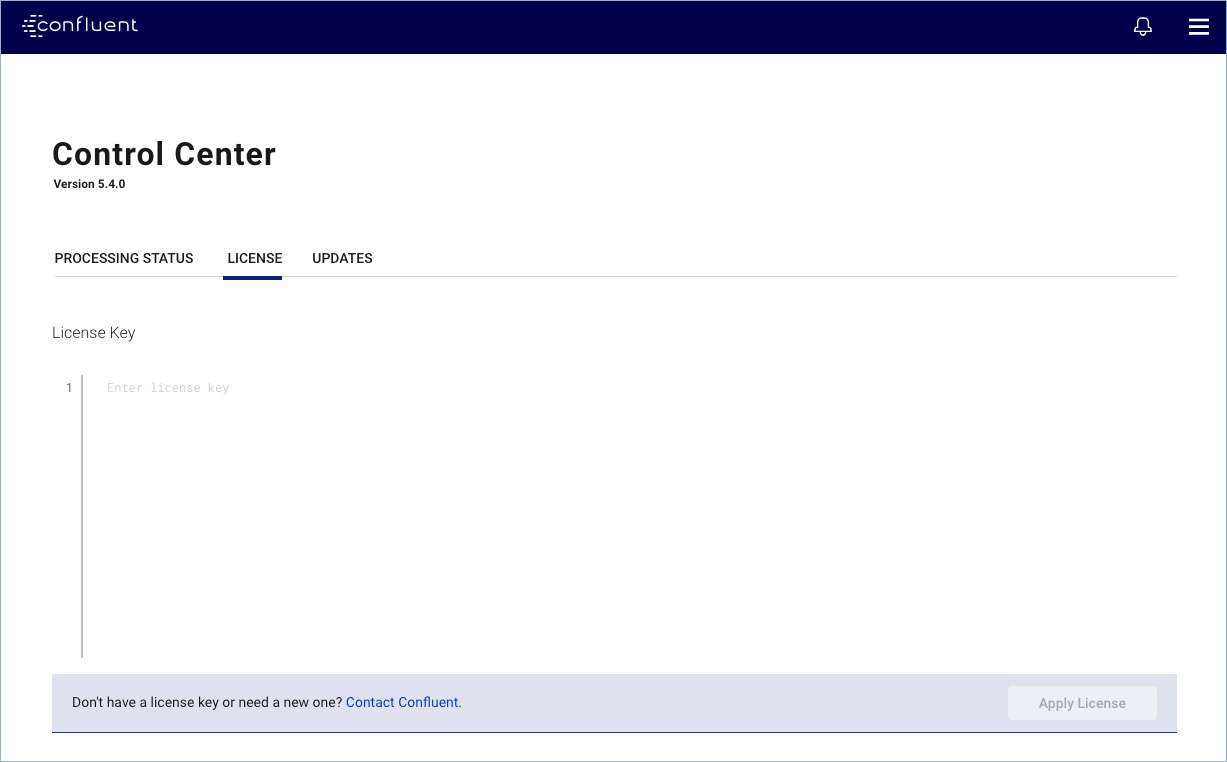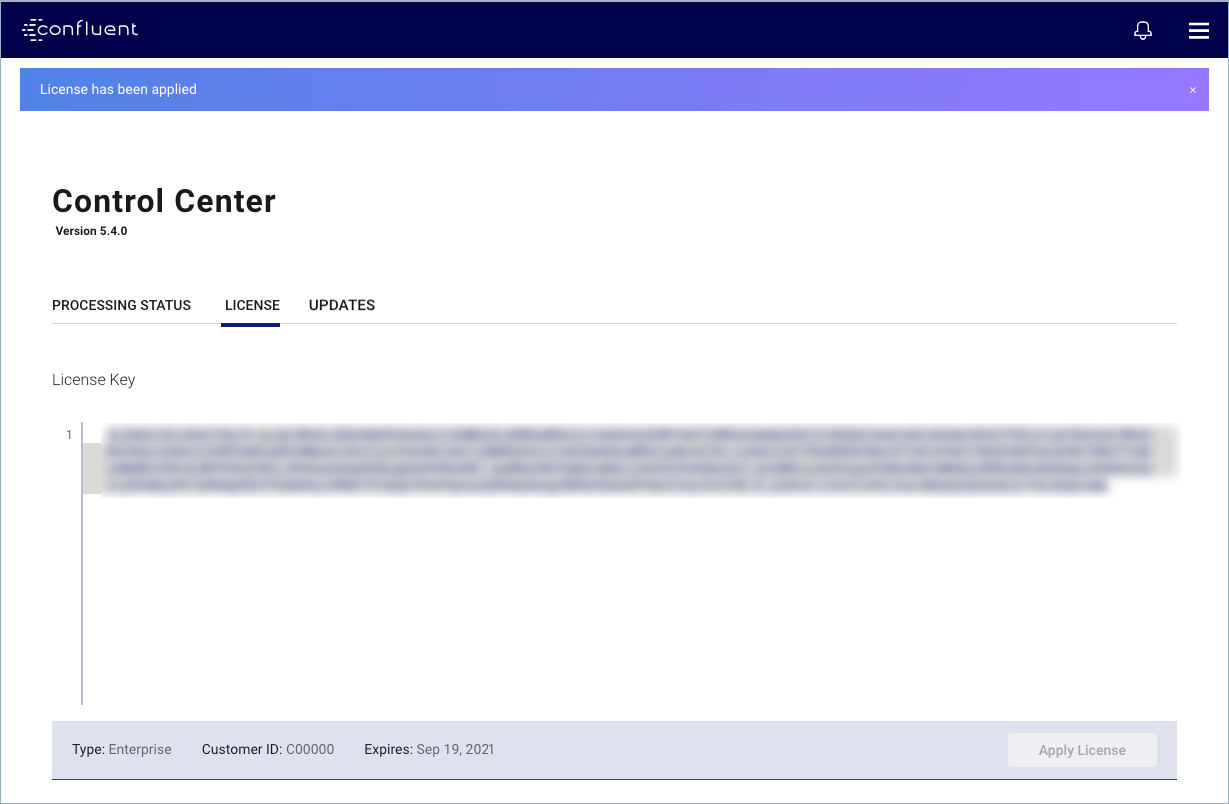Important
You are viewing documentation for an older version of Confluent Platform. For the latest, click here.
Managing Confluent Platform Licenses¶
License Manager provides convenient centralized management of Confluent licenses for Confluent Platform commercial components. The License Manager feature is enabled by default.
As of Confluent Platform versions 5.2 and later, you are clearly notified of license expiration dates with notifications for both trial and enterprise licenses. In addition, the developer license provides unlimited use of commercial features in a single-broker development environment. Upgrading to the most current version 5.4 is strongly recommended.
This documentation pertains to managing licenses for Confluent Platform and its proprietary components, including Confluent evaluation licenses.
The following diagram shows the features available by license:
For information about Confluent Community and Apache 2.0 licenses, see Confluent Community License and Apache 2.0 License respectively.
Types of Confluent Platform licenses¶
Available types of Confluent Platform licenses include:
If the Confluent Platform configuration has only one broker, the developer license is automatically applied by License Manager. If a second broker (or more) is added, License Manager starts a trial license and the 30 day countdown to the trial expiration begins. Enterprise licenses (subscriptions) must be entered by the purchaser.
Developer License¶
A developer license allows full use of Confluent Platform features free of charge for an indefinite duration; however, the license is limited to a single broker configuration per cluster. The developer license gives developers the freedom to try the Confluent Platform commercial features available in a non-production setting.
The developer license also accommodates multiple single-broker clusters so that developers can try the Replicator between those instances, or develop failover applications, for example. Those multiple single-broker clusters share the same license.
Warning
Adding a broker starts a trial license that expires in 30 days. You cannot revert from a trial back to a developer license.
Trial (Evaluation) License¶
A trial (evaluation) license allows a free trial of commercial features in a production setting. Expires after 30 days. The trial license is governed by the Confluent evaluation licenses agreement. The software ceases to function when the license expires. For details, see Confluent Platform commercial components post-expired license.
Enterprise (Subscription) License¶
An enterprise license provides access to all Confluent commercial features for a production environment. An enterprise license is an annual paid subscription that expires after 365 days. The software ceases to function after the license expires. For details, see Confluent Platform commercial components post-expired license.
Entering a license in Confluent Platform commercial components¶
For Control Center, the license key can be entered in the License tab, or in the legacy way using the control-center.properties file.
For the other proprietary components, you must provide an updated license key in the configuration file of a single component. The license is evaluated against whatever licensing is already present in the License Manager. If necessary, that original license is updated to the newly submitted license for the other components to read from.
Note
All components sharing a license topic on the same Kafka cluster will all use the license stored on that topic. For example, if you use Control Center to update the license, then all other licensed components that point to the same license topic on the same Kafka cluster will be governed by that new license, regardless of whether those components define their own license as part of their configuration or define a configuration without a license string.
License Manager also logs the license information, including expiration, and adds warning messages to the log 15 days before expiration.
Confluent Platform commercial components¶
The Confluent Platform licenses (developer, trial, or enterprise) cover the following commercial components:
- Commercial Connectors
- Confluent Control Center
- Confluent Replicator
- Confluent Schema Registry (license is required only when using the Schema Registry Security Plugin)
- Auto Data Balancer (applicable to multiple broker configurations only)
- Confluent Security Plugins
- MQTT Proxy
- JMS client
- Confluent Operator
- RBAC
Confluent Platform commercial connectors¶
The Confluent Platform commercial connectors can be used on an unlimited basis with the developer license for single-broker clusters. Multi-broker clusters can use these commercial connectors for a 30-day trial without an enterprise license key. After the trial period expires, Confluent Platform software ceases to function as described in commercial components post-expiry.
You must purchase an enterprise license to continue using commercial connectors in a multi-broker cluster.
Refer to the individual supported connector documentation for connector-specfic information about license requirements.
Confluent Platform commercial components post-expired license¶
Developer licenses never expire. When a trial or enterprise license expires, the proprietary components react as follows after the next restart attempt:
| Component | Restart reaction after license expiration |
|---|---|
| Control Center | Fails to start. |
| Replicator | Fails to start and throws an exception. |
| Connectors | Fails to start and throw an exception. |
| JMS client | Fails to connect to any brokers and issues a license expiration message. |
| ADB | Fails to calculate the rebalance plan and issues a license expiration message. |
| MQTT Proxy | Fails to start. |
| Security plugins | Fails to start. |
| Confluent Server | Fails to start. Note Confluent Server is the default broker found in the enterprise confluent-<version>.tar.gz download. |
Other commercial feature considerations:
- If brokers are using LDAP authorizer, brokers fail to boot and issue a license expiration message.
Enterprise license expiry notifications¶
The License Manager checks the license status daily. At 90 days before a license expiration date, a notification message prominently displays within the Control Center application the number of days remaining for the license. As the expiration date approaches, notifications become more persistent at the following countdown intervals:
- 90 days: When the approaching license expiration date is in 90 days or less, a dismissible notification appears in the Control Center banner area. After it’s dismissed, the banner notification does not appear again until the expiration date is in 30 days or less.
- 30 days: When the approaching license expiration date is in 30 days or less, a dismissible notification appears in the Control Center banner area. After it’s dismissed, the banner notification does not appear again until the expiration date is in 7 days or less. In addition, an exclamation point displays in the License tab along with a non-dismissible notification.
- 7 days: When the approaching license expiration date is in seven days or less, a dismissible notification appears in the Control Center banner area. Dismissing the banner notification must be done daily (if you don’t want to view it) until the license expiration date has arrived. In addition, an exclamation point displays in the License tab along with a non-dismissible notification. On the last day, the notice counts down the last 24 hours until expiration.
- 0 days (expired): After the license has expired, the banner notification appears in the Control Center application and cannot be dismissed until a new license is applied. The message indicates how long the license has been expired. After applying a new license, the notifications disappear until the 90-day checkpoint starts another countdown cycle.
Renew your license prior to its expiration date to continue using Confluent Platform without interruption. Contact Confluent Support to renew the license.
Trial license expiry notifications¶
Notifications for a trial license start immediately on the first active day of the 30-day trial. The daily notifications are persistent in the Control Center application banner and cannot be dismissed.
When a trial license expires, Confluent Platform ceases to operate as detailed in Confluent Platform commercial components post-expired license. A message prompts you to purchase a license.
- Click Purchase License to purchase an enterprise license and continue using Confluent Platform.
- Click Register License to enter your newly purchased license in the License tab. For details, see Applying an enterprise Confluent Platform license in the Control Center License tab.
Viewing processing status in Control Center¶
View a high-level summary of running and processing status within the Control Center application. Check the status at any time.
In the upper-right corner of Control Center, click the menu icon to open the Administration menu.
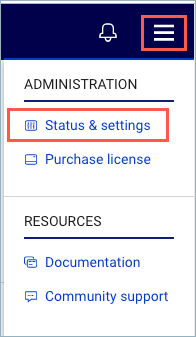
Click Status & Settings. By default, the Processing Status tab appears.
The Processing Status pane displays the status of Control Center (Running or Not Running). Consumption data and Broker data message processing speeds are shown real-time since 30 minutes ago.
Viewing license information in Control Center¶
View the license information within the Control Center application. Check the license status at any time.
Important
If RBAC is enabled, the SystemAdmin role must be granted to a user
on the Kafka cluster that is running Metadata Service (MDS) in order to view or edit a license in the
Control Center web interface. For more information, see Configure RBAC for Control Center.
Warning
If License Manager has been disabled, the License tab cannot be accessed.
- In the upper-right corner of Control Center, click the menu icon to open the Administration menu.
- Click Status & Settings.
- Click the License tab.
The License Key pane displays the license key, type of license, Customer ID (if applicable), and the date the license expires (if it’s not a Developer License).
Purchasing a Confluent Platform license¶
You can request to purchase an enterprise license from within the Control Center application. Request a license if you want to upgrade to an enterprise license from a trial license, or if your trial or enterprise license is about to expire or has expired and needs to be renewed.
In the upper-right corner of Control Center, click the menu icon to open the Administration menu.
Click Purchase License. An email window opens addressed to Confluent sales for you to make your request.
Tip
Existing customers can also request a renewal from Confluent Support.
After you receive the license, apply the license key.
Applying an enterprise Confluent Platform license in the Control Center License tab¶
Applying a valid Enterprise license takes effect immediately and does not require stopping or restarting services. You can apply a new license key to an enterprise license that is about to expire or has expired.
Important
If RBAC is enabled, the SystemAdmin role must be granted to a user
on the Kafka cluster that is running Metadata Service (MDS) in order to view or edit a license in the
Control Center web interface. For more information, see Configure RBAC for Control Center.
You can apply an enterprise license key in the License tab to a trial license prior to its expiration date.
An enterprise license can be applied over a developer license at any time.
Applying a license key in the License tab does not update the license string
property in
the control-center.properties files. The reverse does; however: applying a
license key
in a control-center.properties file updates the license key displayed in the
License tab.
The applied license key is visible in the Control Center log.
To apply a license in the License tab:
In the upper-right corner of Control Center, click the menu icon to open the Administration menu.
Click Status & Settings.
Click the License tab.
Clear the existing key. The
Enter license key promptappears.Paste the license key provided by Confluent into the License Key pane.
Click Apply License.
- If the applied key is invalid, an invalid key entered message appears in red below the License Key pane. Double-check the key and try again.
- If the applied key is valid, a license has been applied message appears in a light blue banner. Click the x to dismiss the banner.
Click the Confluent logo in the upper-left corner to navigate back to Control Center monitoring.
Applying a Confluent Platform license in a Control Center properties file¶
If License Manager has been disabled, or a trial license has expired and the License tab cannot be accessed, use this alternative legacy method to enter a license key.
Besides using the License tab available in the Control Center Administration UI, you
can set the license key in the confluent.license property of the appropriate
control-center.properties file on startup. Enter either the license key or a
path to the license key file.
Applying a license key in a control-center.properties file updates the
license key displayed in the License tab UI. Applying a license key in the
License tab UI does not update the license string property in
the control-center.properties files.
The applied license key is visible in the Control Center log.
To apply a license key for Control Center using configuration properties:
Open the
control-center.propertiesfile for your environment.In the Control Center Settings section, locate License string for the Control Center. Remove the hash # to uncomment the
confluent.licenseoption.Enter the license value or a path to a file that contains the license.
confluent.license=/path/to/license/file
Restart Control Center and pass in the properties file for the configuration to take effect:
./bin/control-center-stop ./bin/control-center-start ../etc/confluent-control-center/control-center.properties
For more details on Control Center configuration options, see Control Center Configuration Reference.
Enabling and disabling the Control Center License Manager feature¶
License Manager is enabled by default.
License Manager can be disabled in Control Center as a preventative measure against potentially installation-wide license issues within an organization.
After disabling License Manager, the License tab in the Control Center Administration UI cannot be accessed by any users. Enter the licence key using an Applying a Confluent Platform license in a Control Center properties file.
To disable License Manager in Control Center:
Set the
confluent.controlcenter.license.manager.enableoption in yourcontrol-center.propertiesfile tofalse.... confluent.controlcenter.license.manager.enable=false ...
Note
Make the change in the appropriate Control Center properties file or files configured for your environments, including
control-center-dev.propertiesorcontrol-center-production.properties. The properties files are located in/path-to-confluent/etc/confluent-control-center/.Restart Control Center and pass in the properties file for the configuration to take effect:
./bin/control-center-stop ./bin/control-center-start ../etc/confluent-control-center/control-center.properties
To enable License Manager again, set the
confluent.controlcenter.license.manager.enable option back to true and
restart Control Center with the updated properties file.
Viewing the Control Center log for License Manager information, warnings, or errors¶
License Manager configuration information and notification warnings show up in the Control Center log. The log displays in stdout by default.
Tip
For production environments, configure log4j to manage multiple rolling logs. For more details, see Logging.
To view the Control Center log in stdout using the Confluent CLI confluent local log command:
<path-to-confluent>/bin/confluent local log control-center
When the License Manager feature is enabled, an entry displays in the log:
confluent.controlcenter.license.manager.enable = true
The version of License Manager also displays in the log:
confluent.controlcenter.license.manager = _confluent-controlcenter-license-manager-5-4-0

